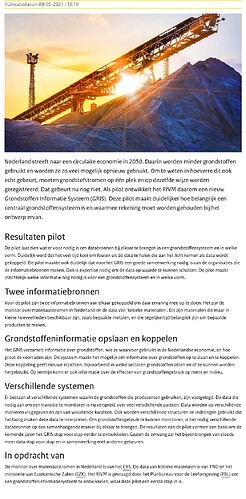The Netherlands wants a circular economy by 2050. They recognized that in order to achieve this they need a central overview of their resources to see what’s used so that recycling won’t be an afterthought. First steps of an RBE? Albeit within the borders of The Netherlands, but with the EU these ideas and methods (NL is not the only one) could become continent-wide in our lifetime.
The following article provides more details, but it’s in Dutch.
The Netherlands aims to have a circular economy in place by 2050. In this new economy, the use of raw materials will be minimised and their reuse will be maximised. To assess the extent to which this actually takes place, RIVM is currently developing a Raw Materials Information System (Grondstoffen Informatie Systeem – GRIS). This system collects information about raw materials, who uses them for what in the Dutch economy and how large the reserves are.
The purpose of the GRIS is to collect and link information regarding raw materials. This linkage provides new insights regarding the sectors in which raw materials are used and whether they can be reused, for example. A pilot project to couple information sources has now been carried out to clarify the value of bringing together information in a raw materials system of this kind and the essential design factors. The pilot project makes clear what information is still needed for a raw materials system and the requisite form.
For the pilot project, two information sources: the Dutch Materials Flow Monitor and ‘critical materials’ dataset, were linked to gain experience with the concept. The data concerns materials that are only available in small quantities, such as certain metals, and are also critical for making specific products.
This would make information systems more compatible. The linkage revealed the ‘errors’ in the data from the two systems; remedying them will be very time-consuming. The pilot project also indicated that close cooperation will be necessary between organisations creating the information sources for GRIS. Expertise is also key in evaluating the data.
The Dutch Materials Flow Monitor is conducted by the National Statistics Office (CBS). The monitor of critical materials is conducted by the Netherlands Organisation for Applied Scientific Research (TNO) and the Ministry of Economic Affairs (EZK). the Netherlands Environmental Assessment Agency (Planbureau voor de Leefomgeving – PBL) has commissioned RIVM to develop the system.
I guess the @chapter_netherlands can retire ![]()
